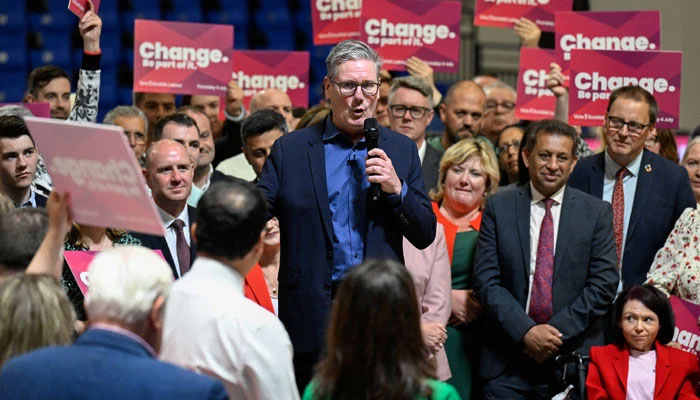Labour’s fiscal dilemma: challenges and strategies ahead
Britain’s Labour Party is back in government for the first time since 2010 and has promised to hit the ground running with its plan to fix the economy. First it needs to find the money, Bloomberg reports.
On some problems, incoming Prime Minister Keir Starmer may try to play for time by pushing out big decisions to next year. But many crises are so acute there’ll be no choice but to tackle them immediately.
In particular, a series of tricky short-term decisions await on public sector pay, fuel duties, and healthcare and prison funding.
Resolving those would cost as much as GBP10 billion, official forecasts and think tank calculations show. Fixing the public services long-term will need another GBP20 billion or more, according to the International Monetary Fund.
The question is how new Chancellor of the Exchequer Rachel Reeves can do that when the debt ratio is close to 100 per cent, trend growth is anemic and the tax burden is the highest in decades.
Government Debt Is at Levels Last Seen in 1961
Labour won a near-record number of seats in Thursday’s election as the Conservatives slumped to their worst ever result.
As well as addressing mammoth problems that have grown over years, Starmer and Reeves face the additional challenge of keeping onside a public that voted for change and won’t have much tolerance for bad news.
During the election campaign, the Institute for Fiscal Studies think tank accused both parties of a “conspiracy of silence” over the painful decisions that need to be taken.
‘No Money’
In 2010, Labour’s last Treasury team left the incoming government a note saying “I’m afraid there is no money.” The situation facing Reeves, Britain’s first female chancellor, is similarly bleak. Depleted finances, huge bills to fix creaking public services and taxpayers who just can’t take any more.
The capacity for markets to bankroll further spending may be limited, with the UK already planning to raise more than GBP277 billion from bond investors this fiscal year, one of the largest targets on record.
And still fresh is the memory of Liz Truss’s disastrous premiership in 2022 and the bond-market fallout from her budget plans.
Strategists at UBS Group AG see continuing pressure on UK bonds — particularly longer-dated debt -- given lingering fiscal concerns.
That said, markets have been remarkably sanguine about the prospect of a Labour government. Gone are the anxieties about skyrocketing taxes or nationalization that’s haunted previous party campaigns; instead, investors see an end to the political tumult of recent years.
Volatility across stocks, bonds and foreign exchange has fallen to near multi-year lows and UK assets rose in the wake of the result.
“Reeves has so far been cognizant of the mistakes made by the Trussonomics experiment and has no intention of spooking the gilt market,” said Craig Inches, head of rates and cash at Royal London Asset Management. Still, given Labour’s spending plans and pledge not to raise taxes, “there is a likelihood that in her first Autumn statement the new chancellor could be coming cap in hand to the gilt market for some additional cash.”
Out of the Blocks
Labour’s early weeks will be peppered with policy announcements, including on employment rights and new state institutions like GB Energy and the National Wealth Fund, before the big fiscal event: the budget in September or October.
That will be the first real test. It will be too soon for the economic growth Starmer hopes can deliver the funds he desperately needs. Instead, Reeves will find herself trapped by her fiscal rules, her aspiration not to raise the tax burden and urgent calls on the public purse.
-
 Meghan Markle Showcases Princess Lilibet Face On Valentine’s Day
Meghan Markle Showcases Princess Lilibet Face On Valentine’s Day -
 Harry Styles Opens Up About Isolation After One Direction Split
Harry Styles Opens Up About Isolation After One Direction Split -
 Shamed Andrew Was ‘face To Face’ With Epstein Files, Mocked For Lying
Shamed Andrew Was ‘face To Face’ With Epstein Files, Mocked For Lying -
 Kanye West Projected To Explode Music Charts With 'Bully' After He Apologized Over Antisemitism
Kanye West Projected To Explode Music Charts With 'Bully' After He Apologized Over Antisemitism -
 Leighton Meester Reflects On How Valentine’s Day Feels Like Now
Leighton Meester Reflects On How Valentine’s Day Feels Like Now -
 Sarah Ferguson ‘won’t Let Go Without A Fight’ After Royal Exile
Sarah Ferguson ‘won’t Let Go Without A Fight’ After Royal Exile -
 Adam Sandler Makes Brutal Confession: 'I Do Not Love Comedy First'
Adam Sandler Makes Brutal Confession: 'I Do Not Love Comedy First' -
 'Harry Potter' Star Rupert Grint Shares Where He Stands Politically
'Harry Potter' Star Rupert Grint Shares Where He Stands Politically -
 Drama Outside Nancy Guthrie's Home Unfolds Described As 'circus'
Drama Outside Nancy Guthrie's Home Unfolds Described As 'circus' -
 Marco Rubio Sends Message Of Unity To Europe
Marco Rubio Sends Message Of Unity To Europe -
 Savannah's Interview With Epstein Victim, Who Sued UK's Andrew, Surfaces Amid Guthrie Abduction
Savannah's Interview With Epstein Victim, Who Sued UK's Andrew, Surfaces Amid Guthrie Abduction -
 Piers Morgan Supports Bad Bunny As US Lawmakers Seek Action
Piers Morgan Supports Bad Bunny As US Lawmakers Seek Action -
 Jennifer Love Hewitt Reminisces About Workign With Betty White
Jennifer Love Hewitt Reminisces About Workign With Betty White -
 Hilarie Burton Reveals Valentine's Day Plans With Jeffrey Dean Morgan
Hilarie Burton Reveals Valentine's Day Plans With Jeffrey Dean Morgan -
 Cardi B Compares Her Fall To Government At Las Vegas Show
Cardi B Compares Her Fall To Government At Las Vegas Show -
 Harry Styles Silently Deleted Instagram App
Harry Styles Silently Deleted Instagram App




